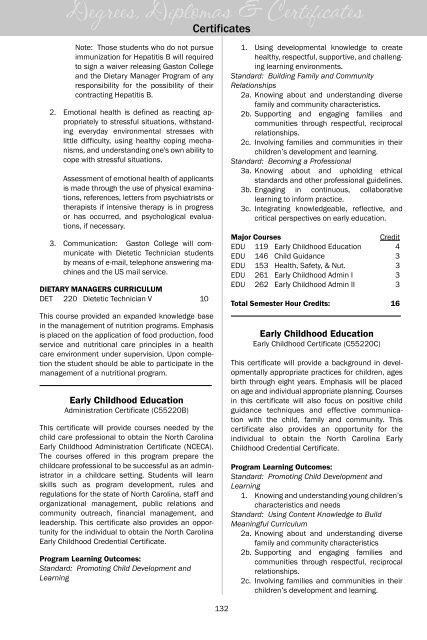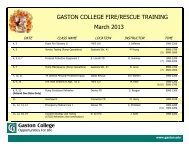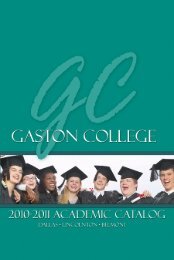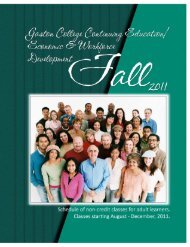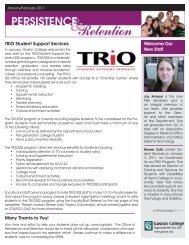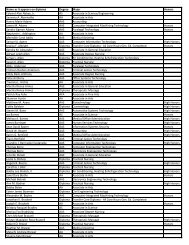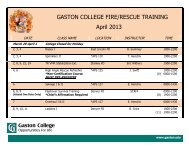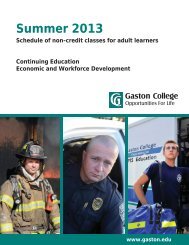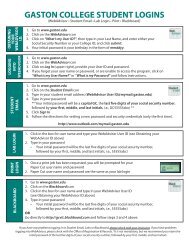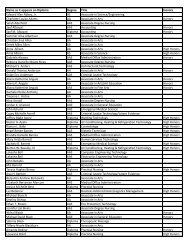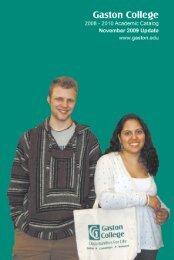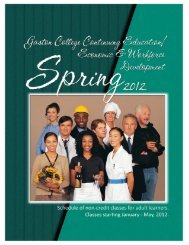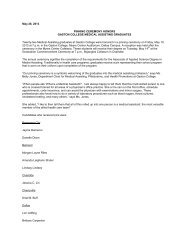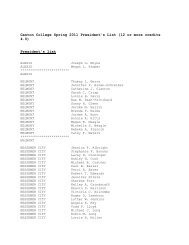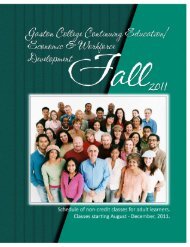GC Catalog 2011 2012 - Gaston College
GC Catalog 2011 2012 - Gaston College
GC Catalog 2011 2012 - Gaston College
- No tags were found...
You also want an ePaper? Increase the reach of your titles
YUMPU automatically turns print PDFs into web optimized ePapers that Google loves.
Degrees, Diplomas & CertificatesCertificatesNote: Those students who do not pursueimmunization for Hepatitis B will requiredto sign a waiver releasing <strong>Gaston</strong> <strong>College</strong>and the Dietary Manager Program of anyresponsibility for the possibility of theircontracting Hepatitis B.2. Emotional health is defined as reacting appropriatelyto stressful situations, withstandingeveryday environmental stresses withlittle difficulty, using healthy coping mechanisms,and understanding one's own ability tocope with stressful situations.Assessment of emotional health of applicantsis made through the use of physical examinations,references, letters from psychiatrists ortherapists if intensive therapy is in progressor has occurred, and psychological evaluations,if necessary.3. Communication: <strong>Gaston</strong> <strong>College</strong> will communicatewith Dietetic Technician studentsby means of e-mail, telephone answering machinesand the US mail service.DIETARY MANAGERS CURRICULUMDET 220 Dietetic Technician V 10This course provided an expanded knowledge basein the management of nutrition programs. Emphasisis placed on the application of food production, foodservice and nutritional care principles in a healthcare environment under supervision. Upon completionthe student should be able to participate in themanagement of a nutritional program.Early Childhood EducationAdministration Certificate (C55220B)This certificate will provide courses needed by thechild care professional to obtain the North CarolinaEarly Childhood Administration Certificate (NCECA).The courses offered in this program prepare thechildcare professional to be successful as an administratorin a childcare setting. Students will learnskills such as program development, rules andregulations for the state of North Carolina, staff andorganizational management, public relations andcommunity outreach, financial management, andleadership. This certificate also provides an opportunityfor the individual to obtain the North CarolinaEarly Childhood Credential Certificate.Program Learning Outcomes:Standard: Promoting Child Development andLearning1. Using developmental knowledge to createhealthy, respectful, supportive, and challenginglearning environments.Standard: Building Family and CommunityRelationships2a. Knowing about and understanding diversefamily and community characteristics.2b. Supporting and engaging families andcommunities through respectful, reciprocalrelationships.2c. Involving families and communities in theirchildren’s development and learning.Standard: Becoming a Professional3a. Knowing about and upholding ethicalstandards and other professional guidelines.3b. Engaging in continuous, collaborativelearning to inform practice.3c. Integrating knowledgeable, reflective, andcritical perspectives on early education.Major CoursesCreditEDU 119 Early Childhood Education 4EDU 146 Child Guidance 3EDU 153 Health, Safety, & Nut. 3EDU 261 Early Childhood Admin I 3EDU 262 Early Childhood Admin II 3Total Semester Hour Credits: 16Early Childhood EducationEarly Childhood Certificate (C55220C)This certificate will provide a background in developmentallyappropriate practices for children, agesbirth through eight years. Emphasis will be placedon age and individual appropriate planning. Coursesin this certificate will also focus on positive childguidance techniques and effective communicationwith the child, family and community. Thiscertificate also provides an opportunity for theindividual to obtain the North Carolina EarlyChildhood Credential Certificate.Program Learning Outcomes:Standard: Promoting Child Development andLearning1. Knowing and understanding young children’scharacteristics and needsStandard: Using Content Knowledge to BuildMeaningful Curriculum2a. Knowing about and understanding diversefamily and community characteristics2b. Supporting and engaging families andcommunities through respectful, reciprocalrelationships.2c. Involving families and communities in theirchildren’s development and learning.132


